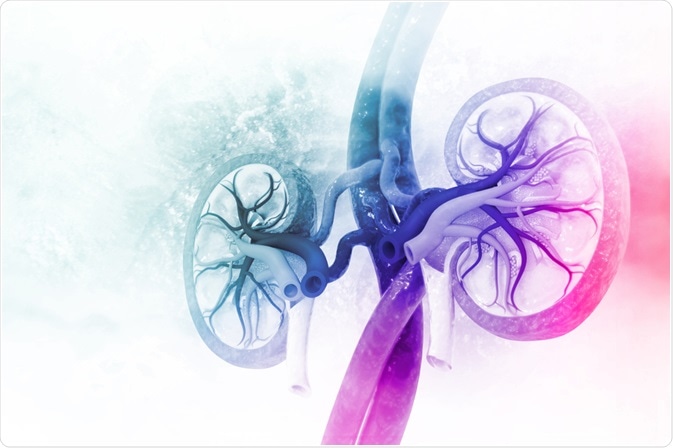Most people with chronic kidney disease (CKD) do not notice any symptoms of the condition because the body naturally has greater kidney function than necessary and can tolerate a significant reduction without effects.

Image Credit: crystal light / Shutterstock.com
In fact, many cases of CKD are detected with a routine blood test or urinalysis. Patients with CKD usually have regular tests to monitor the kidney function and take prophylactic action if necessary to prevent the presentation of symptoms.
As the severity of the condition progress and the kidney function decreases significantly, some symptoms may begin to develop. However, these are non-specific symptoms that may be caused by many different health conditions of varying severity.
Urination changes
As the primary function of the kidneys is to produce urine, the urine output is likely to change in patients with severe CKD.
It is common to urinate more frequently than normal, particularly during the night, and there may be some discomfort or pressure while urinating. The urine may change in appearance to look foamy, bubbly, cloudy or reddened, due to the presence of protein, blood, or other substances in the urine.
Peripheral edema
When the function of the kidneys decreases, they become less efficient at removing excess fluid from the body. As a result, this fluid can build up and cause swelling in the extremities such as the feet and hands.
The accumulation of fluid in these locations of the body is often referred to as peripheral edema. Peripheral edema may make it difficult to put shoes on, walk around, or make fine movements with the hands.
Fatigue
Erythropoietin (EPO) is produced in the kidneys and is important in the production of hemoglobin and red blood cells. Patients with CKD tend to produce less EPO and, as a result, the concentration of red blood cells in the circulation decreases. This can cause anemia and symptoms such as fatigue because the muscles and brain tire more readily.
Itchy skin
When kidney function is reduced, the body is less effective at excreting waste from the bloodstream through the urine. Stemming from this, waste products can build up in the blood and cause significant itching.
Understand the Signs & Symptoms of Chronic Kidney Disease (CKD)
Loss of appetite and weight changes
Many patients with CKD find that they have reduced appetite and may lose weight quickly. This can be linked to the accumulation of waste products in the blood, which can cause a foul metallic taste in the mouth and bad breath.
Certain foods such as meat may also be less appealing to patients with CKD. Some cases of CKD may also be associated with nausea and vomiting, which can also lead to a further loss of weight.
Shortness of breath
Dyspnea, also commonly referred to as shortness of breath, is a frequent complaint in patients with CKD. The reason for this is two-fold, as there may be a build-up of fluid in the lungs or anemia may cause increased load on the lungs to carry oxygen around the body.
Dizziness
Many patients may notice symptoms related to the function of the brain due to the reduction in their oxygen supply. As a result, people with CKD may feel dizzy, have difficulty concentrating, or have problems with their memory.
Pain
The majority of patients with CKD do not report pain near the kidneys and, therefore, any pain is usually linked to another condition. However, some patients do experience pain, particularly those who have a concurrent health condition such as polycystic kidney disease, an infection, or stones in the renal tract.
References
Further Reading
Last Updated: May 22, 2021